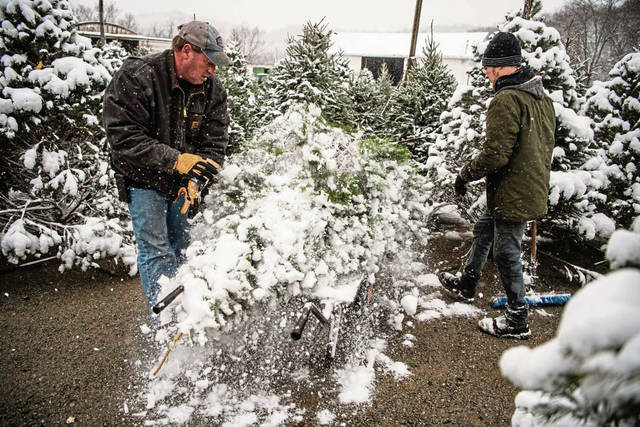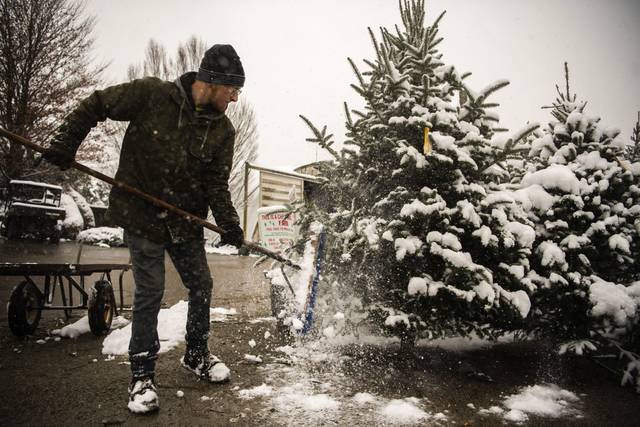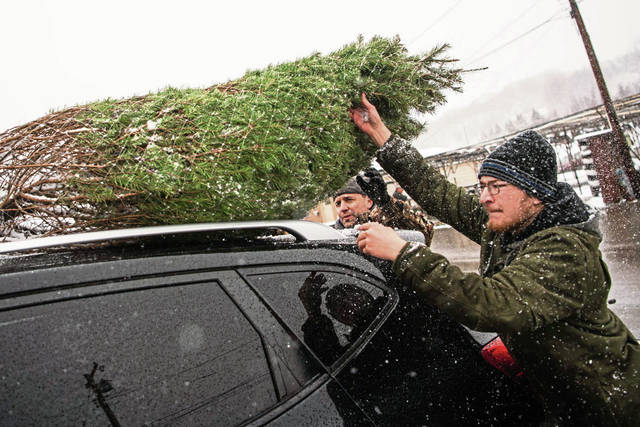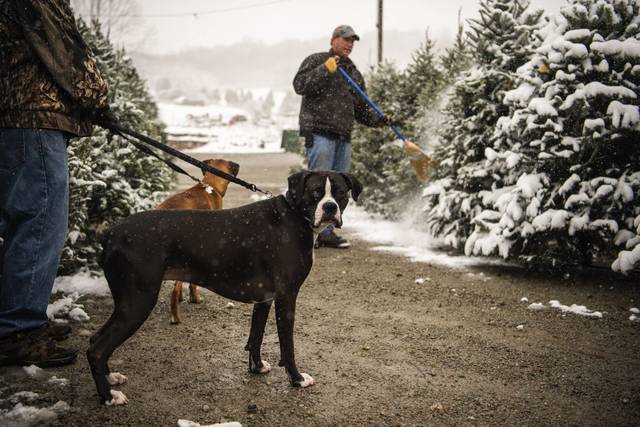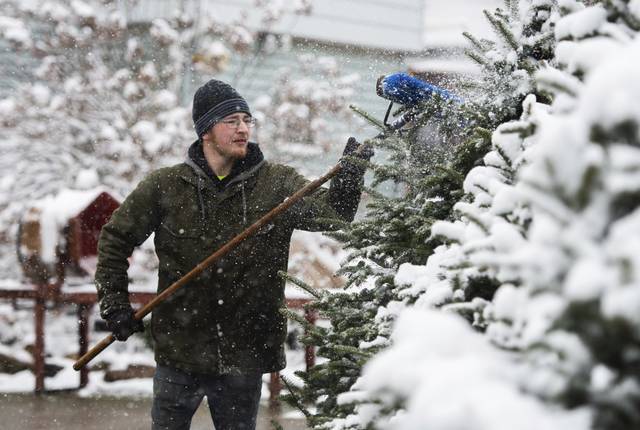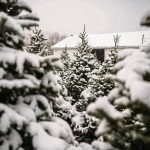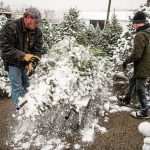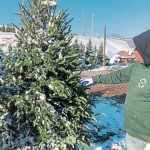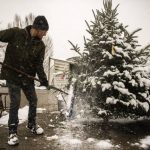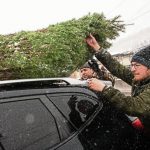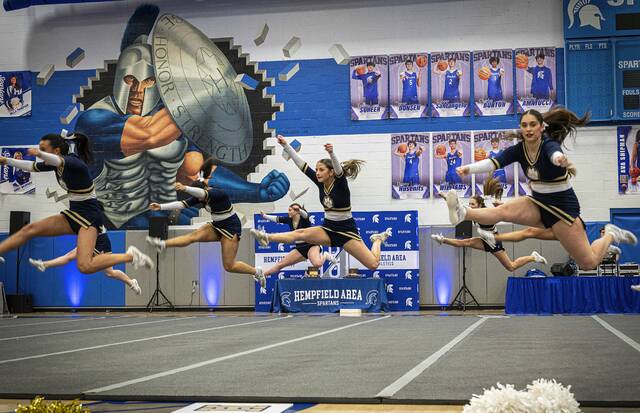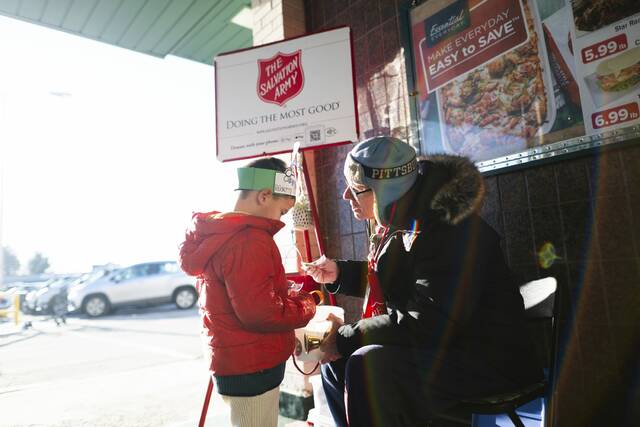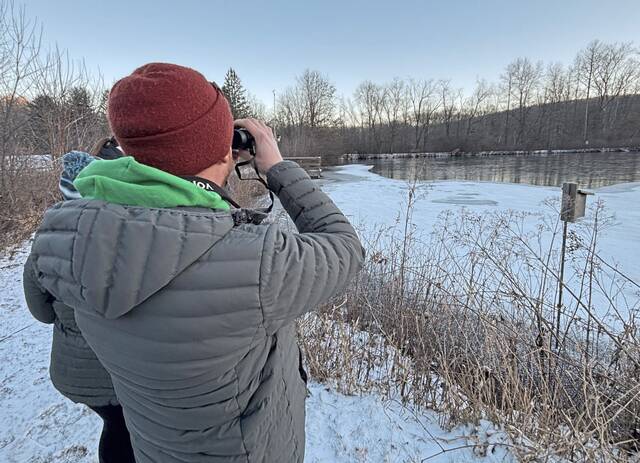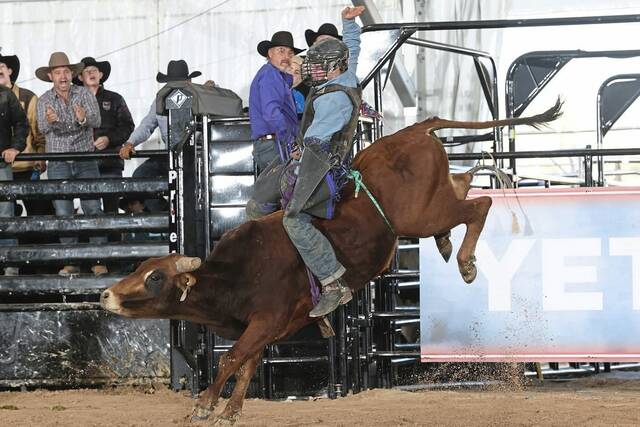John Fazio and family drove all the way from Swissvale to a tree farm east of New Alexandria this week so he and his son, John, could trudge up a hillside, where he got to lie down in 4 inches of snow and wield a bow saw to cut down the tall Christmas tree they wanted.
They preferred the nearly hour drive east from the Pittsburgh suburb over simply buying a pre-cut one at a roadside stand in the city.
The Fazios bought the tree at Fleming Christmas Tree Farm off Route 22 in Derry Township, where “business is booming,” said owner Preston Fleming of Armstrong Township, Indiana County.
Customers can cut their owns trees or buy one of the firs or blue spruces that have been cut from his stock growing on the rolling hills of the 69-acre farm.
“The tree market is amazing this year,” in part because fewer growers are selling trees, said Fleming, 32, who learned the Christmas tree farm business working as a teenager for his cousin, Jerry D. Fleming, whose family owned several tree farms around Indiana and Westmoreland counties.
Another mid-week buyer, Geraldine Boring of Unity, brought her granddaughters, Alayna, 8, and Kylee, 4, to help select their tree, a venture she said would be topped off with hot chocolate when they got home.
Tree sales were good around Thanksgiving, said Jason Wilkinson, owner of Jason Wilkinson Nursery of Armbrust. He is hoping the weather this weekend will be mild enough for a few more days of good sales.
Average price for the trees, the growers said, is about $10 per foot, depending on the size.
A retail lot operated by Boy Scout Troop 284 in Irwin saw an increase of about 20% from last year, plus the delivery costs from Musser Nursey in Indiana increased, said Marty Tougher, assistant scoutmaster for the troop.
Tougher said they bought the same number of trees, 175, as last year for their sale at the Busy Beaver parking lot in the Norwin Hills Shopping Center in North Huntingdon.
Wilkinson, a 45-year-old, third-generation tree farmer, said he anticipates cutting 400 t0 500 trees for sale this season. Unlike other growers, Wilkinson said he only cuts trees for his business and does not sell them to other nurseries or roadside tree sales. His primary business remains landscaping and his nursery, so he only devotes a small amount of acreage to Christmas trees, Wilkinson said.
“It’s not uncommon to have 50% to 60% of the sales” by around Thanksgiving, said Doug Hundley, a spokesman for the National Christmas Tree Association, a Colorado-based trade association.
At Mytrysak Family Tree Farm in Armstrong Township, Indiana County, the tree business has been going well this year, said Stacey Mytrysak, who owns the former Fleming tree farm with her husband, Brandon. They allow customers to select their trees for cutting by staff or to buy them pre-cut, Mytrysak said. What has been slow for them this year, however, has been business at the gift shop, which Mytrysak attributes to concern over covid-19.
Tree shortage expected
While sales point to a good season for live Christmas trees, growers in the region see dark clouds on the horizon — a coming scarcity of trees.
“There is such a huge shortage of trees,” said Wilkinson, whose grandfather started the nursery and tree farm in 1932.
“Fraser (fir) is the most popular and what everybody wants. There is such a shortage of Frasers,” said Stacey Mytrysak. To keep the tree pipeline intact, they planted a few thousand trees this year.
Wilkinson blames the shortage on the economic collapse in 2008. It forced tree growers to choose between paying taxes or planting trees, he said.
“There will be a slim selection of trees next year,” which will drive up the price, Fleming said.
Greg Van Horn, president of the Indiana County Christmas Tree Growers Association, blames it on the drought this year and the Rhabdocline needlecast disease that devastated the firs 10 years ago.
But, the concern over a tree shortage is “always a struggle” between the 15,000 to 20,000 growers nationally and retailers that want a specific kind of tree, said Hundley, of the national association.
“We have a totally adequate supply of Christmas trees. We have a healthy balance between supply and demand,” said Hundley, noting that 25 million to 30 million Christmas trees have been sold annually the past few years.
From Fleming’s perspective, however, there will be a shortage in the region because the growers who started out in the 1960s and 70s are at retirement age and no longer want to do all of the work that is required to have a successful tree farm.
“Those guys — mostly independent, small farmers — are in their 70s and 80s and are ready to retire,” Hundley said.
Van Horn has seen the association’s membership in Indiana County, which for decades has been called the Christmas Tree Capital of the World, has shrunk from about 200 growers in the 1960s to about five today. Now, the Eastern market is driven by growers in North Carolina, where the climate that is good for growing Douglas firs, Van Horn said.
“The younger families don’t want to get into it,” said Van Horn, who grows his trees on a five-acre plot and mostly sells to his customers.
‘Not as profitable’
Wilkinson agreed that growers are leaving the labor-intensive business. They buy either seedlings or transplants to plant, spread fertilizer, mow around the trees to keep an air flow at the base of tree, shear branches and spray pesticides to kill bugs, Wilkinson said.
It takes eight-to-10 years for firs and spruces to grow tall enough for someone to want to buy them. They have to worry about the deer eating their trees, particularly when snow covers the ground, Van Horn said.
With a large tree farm, labor must be hired at a competitive rate to do all that work, Fleming said.
Those who want to buy a tree farm that has the trees that will generate revenue now and in the near future can pay a good price for the land.
Preston Fleming bought his 69 acres off a Derry Township tree farm from his cousin, Jerry D. Fleming and wife, Lucinda, for $355,000 in September, according to documents filed in the Westmoreland County Recorder of Deeds.
To generate more revenue than he can get from just his farm, Fleming said he leases to other tree farmers and buys trees from other farms, so he was able sell wholesale to roadside tree stands operated by nonprofits, nurseries such asTrax Farms near Finleyville and home improvement stores.
The Mytrysaks, who bought 57 acres of Jerry Fleming’s tree farm and gift shop under the corporate name of Mytrysak Rentals LLC of Brush Valley, paid $500,000 for the business and land, according to documents filed in the Indiana County Recorder of Deeds.
What makes the business all the harder to generate an income is that there has been only a slight increase in price for a number of years, and that has discouraged tree growers, Hundley said.
“Christmas trees have not been as profitable as we wish it had been,” he said.
Wilkinson said he is not encouraging his children to be the next generation to go into the tree farm business.
Customers might complain about the cost of a live tree, without realizing “what we do for 12 years to make $80,” Wilkinson said.



